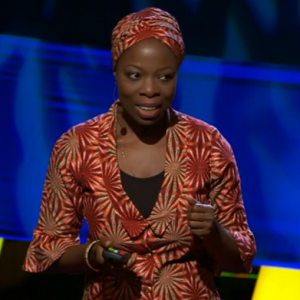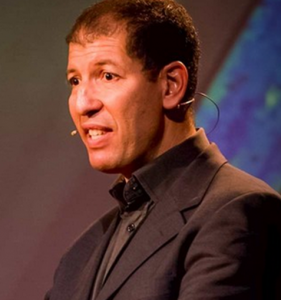Educational videos for plant biology: TED, iBiology and Gatsby Plants Summer School
We’ve assembled a collection of relatively accessible talks by scientists. These include: TED talks, which are directed at a general audience, the iBiology series, where speakers deliver a general talk followed by a research-focused talk, and videos of lectures at the Gatsby Plants summer school for undergraduate students. Most of these talks would be suitable for high school or undergraduate students.

TED talks. TED (Technology, Entertainment, Design) talks are well-rehearsed 15 minute presentations designed to instill enthusiasm in the audience. Plant-oriented TED talks run the gamut from biofuels to urban gardening. Did we miss any? Let us know!
Achenyo Idachaba: How I turned a deadly plant into a thriving business
Ameenah Gurib-Fakim: Humble plants that hide surprising secrets
Antonio Donato Nobre: The magic of the Amazon: A river that flows invisibly all around us (in Portuguese with English subtitles)
Ariel Novoplansky: Learning plant learning
Bilal Bomani: Plant fuels that could power a jet
Caleb Harper: This computer will grow your food in the future
Cary Fowler: One seed at a time, protecting the future of food
Jill Farrant: How can we make crops survive without water
Jonathan Drori: The beautiful tricks of flowers, also Why we’re storing billions of seeds and Every pollen grain tells a story
Juan Enriquez: Using biology to rethink the energy challenge
Jonathan Trent: Energy from floating algae ponds
Louie Schwartzberg: The hidden beauty of pollination
Marla Spivak: Why bees are disappearing
Michael Pollan: A plant’s eye view
Mohamed Hijri: A simple solution to the coming phosphorus crisis
Nalini Nadkarni: Conserving the canopy
Pamela Ronald: The case for engineering our food
Rachel Sussman: The world’s oldest living things
Richard Preston: The mysterious lives of giant trees
Ron Finley: A guerilla gardener in South Central LA
Rose Goslinga: Crop insurance, an idea worth seeding
Seth Murray: How Technological Change Drives Improvement in Plant Breeding & Agriculture
Stefano Mancuso: The roots of plant intelligence
Stephen Ritz: A teacher growing green in the South Bronx
Suzanne Simard: How trees talk to each other

iBiology series. iBiology’s mission is “to convey, in the form of open-access free videos, the excitement of modern biology and the process by which scientific discoveries are made”. Read more about their objectives here and explore their website for other educational resources.
Chris Somerville: 1. The argument for biofuels, and 2. Cellulosic biofuels
Dominique Bergmann: 1. Key issues in plant development, 2. Stomata as a model for stem cells, and 3. Stomata and the global climate cycle
Eliot Meyerowitz: 1. Why we need to understand plant development, 2: Vernalization: how winter cold promotes flowering, and 3. Plant development: Physical force as a signaling mechanism
Jay Keasling: Engineering microbes to solve global challenges
Luis Herrera-Estrella : 1. Plant nutrition and sustainable agriculture, 2. Phosphorus: an essential plant nutrient, and 3. An environmentally friendly phosphorus fertilization system
Pamela Ronald: 1. Sustainable agriculture, and 2. Engineering Resistance to Infection and Tolerance to Stresses
Richard Amasino: 1. How plants “know” when to flower, and 2. Vernalization: how winter cold promotes flowering
Also, Richard Amasino has recorded a video that explains how plants are ideal for teaching Genetics in the classroom.
Roger Beachy: 1. Biology of plant-virus infection, and 2: Genetic Engineering for Virus Resistance in Plants
Sharon Long: 1: Cooperation between bacteria and plants for protein nutrition, 2. Function and regulation of Sinorhizobium nodulation genes, and 3. Plant genes and cell response in nitrogen-fixing symbiosis
Susan Wessler: 1. Introduction to transposable elements, and 2. How transposable elements amplify throughout genomes

Gatsby Plants Summer School video lecture series. The Gatsby Plant Science Summer School for undergraduate students was established by the University of Leeds in 2005 and is now part of the Gatsby Plant Science Education Programme at the University of Cambridge. Lectures by plant scientists are a feature of the Summer School, many of which are available online. In a partnership with the Global Plant Council, many of the lectures have transcripts in other languages: see the home page at the Plant Science TREE.
Alistair Fitter: People, plants and planet
Alistair Hetherington: Stomata: Key elements essential for the success of the vascular plants
Andrew Millar: Plant science leads the way in understanding biological timekeeping
Beverley Glover: Flowering plant diversity: development, function and evolution
Bob Goldberg: Super plants for the 21st century
Cathie Martin: Engineering plant metabolism for healthy foods
David Beerling: Stomatal pores: ancient gateways to evolution and global change
David Salt: Revealing molecular mechanisms of plant nutrition using “Big Data”
Giles Oldroyd: Engineering the nitrogen symbiosis for smallholder farmers in Africa
George Lomonossoff: Using plant viruses in bio- and nano-technology
James Barber: Can we build an artificial leaf to efficiently capture and use solar energy?
John Christie: Seeing the light: from plant growth to optogenetics
Jonathan Napier: Fish oils and seeds for healthy foods
Julian Ma: Improving global health with GM plants – seeds of hope
Malcolm Bennett: What happens below ground? A multidisciplinary approach to Root Biology
Mark Knight: How do plants feel?
Ottoline Leyser: Thinking like a vegetable: How plants decide what to do
Robert Zeigler: Importance of rice and food security
Sandra Knapp: Understanding plant diversity – mission to an almost unknown planet
Sarah O-Connor: How do plants make anti-cancer drugs?
Saskia Hogenhout: Insect vectors and vector-borne disease agents of plants – the surprising dynamics of interactions among three unrelated organisms
Simon McQueen-Mason: Developing biorenewable fuels and materials from plants
Sophien Kamoun: Next generation disease resistance breeding in plants
Steve Long: Food, Feed and Fuel from Crops under Global Atmospheric Change. Could we have it all in 2030?
Toby Pennington: What is the most endangered type of tropical forest and why is so little being done to protect it?
Did we miss any? Let us know!



